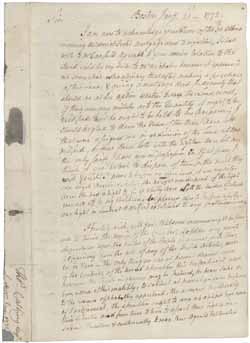Collections Online
Letter from Thomas Cushing to Roger Sherman, 21 January 1772
To order an image, navigate to the full
display and click "request this image"
on the blue toolbar.
-
Choose an alternate description of this item written for these projects:
- Main description
[ This description is from the project: Coming of the American Revolution ]
In this letter, merchant and politician Thomas Cushing writes to Roger Sherman, head of the New Haven Committee of Correspondence, urging that the various assemblies of the colonies "should act one & the same part" in order to present a stronger coordinated effort against British rule.
Ignorance is slavery
By the early 1770s, Boston's patriot leaders have had many opportunities to rally townspeople against perceived injustices (usually acts of Parliament or other objectionable activities undertaken by the British government or soldiery). Men like Samuel Adams understand that an informed citizenry is the best weapon against unfavorable government policy. Political ignorance is simply another form of slavery. How do patriots impart political knowledge to such a vast audience? Ministers, newspaper publishers, and even the Massachusetts General Assembly work to educate the public, but in 1771, patriot leaders in Boston experiment with a new form of instruction. They initiate an annual town lecture, which will be held each year on 5 March, an important anniversary for Bostonians. Some colonial leaders are skeptical, and question whether the general public can be educated in the ways of politics through such popular means.
Questions to Consider
1. What seems to be the primary purpose of Cushing's letter to Roger Sherman?
2. In what group or body does Cushing rest his hopes for colonial union? How does he believe this group can act to "revive the Union of the Colonies?"
3. Why would Bostonians choose to initiate a public lecture series on 5 March? What event took place on that date?
Further Exploration
4. Who is Thomas Cushing? What is his role in Massachusetts politics in 1772?
5. Cushing refers to "Duty Articles" that colonists are to refrain from using. What specific items is he talking about? Hint: learn more about the Townshend Acts from this website, your textbook, or another reference sources.
6. Who delivered the first 5 March oration in 1771? Why do you think this person was selected?
7. Political participation is still an important part of United States government today. In what ways do we motivate people to become politically active in their communities and beyond?

